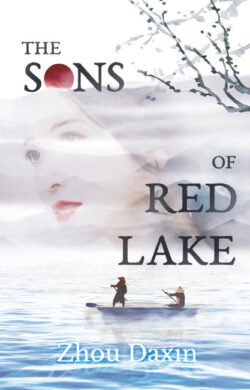Sons of Red Lake, by Zhou Daxin
translated by Haiwang Yuan and Thomas Bray
(Sinoist Books, 2022)

Publisher's Blurb
The road to prosperity is paved by the poor.
An ailing mother forces Nuannuan to abandon her cherished metropolitan life and return to Chu Wang. Once there, she finds her birthplace fragmented and forgotten by modernity. Despite warnings, she quickly reconnects with Kaitian, a childhood sweetheart.
The village is centred around Red Lake, whose misty shores once provided solace to ancient kings and their entourages. The couple unearth forgotten treasures left behind from this royal past and are quick to capitalise, setting off a boom in tourism.
Word of the lake’s beauty spreads, attracting rampant outsider investment and infecting the sleepy village with dark tastes and unsettling appetites. Drunk on power, the newly elected mayor quickly starts to reshape Chu Wang to his own corrupt ends. Determined to share in this new abundance, will the villagers swap one type of poverty for another?
Reading Chinese Network Reviews
Reviewed by Z.Z. Lehmberg, 19/4/23
 I left China in December 1982 to go to the U.S. to pursue my dream, which, at the time, was to obtain a Ph.D. I didn’t know what I wanted to study, but I thought I would get a Ph.D. simply because it was not available in China at that time. The ‘80s were an exciting time for us Chinese, who had just endured the ten-year internal turmoil called the Cultural Revolution, and we could finally put Deng Xiaoping’s wise words, uttered in the early ’60s, to practice: A good cat is one who can catch mice, no matter its color. We were finally free to do what we wanted to do – everything was, all of a sudden, a possibility given sufficient merit, ability, and hard work – including pursuing a higher education and getting rich.
I left China in December 1982 to go to the U.S. to pursue my dream, which, at the time, was to obtain a Ph.D. I didn’t know what I wanted to study, but I thought I would get a Ph.D. simply because it was not available in China at that time. The ‘80s were an exciting time for us Chinese, who had just endured the ten-year internal turmoil called the Cultural Revolution, and we could finally put Deng Xiaoping’s wise words, uttered in the early ’60s, to practice: A good cat is one who can catch mice, no matter its color. We were finally free to do what we wanted to do – everything was, all of a sudden, a possibility given sufficient merit, ability, and hard work – including pursuing a higher education and getting rich.
The Sons of Red Lake by Zhou Daxin is a rags-to-riches story, which tells the triumphs and failures of a group of country folks in their pursuit of prosperity. When I first received my copy of the book, I was dazzled by the cover of the book (English version). The words “sons” and “Red Lake” stood out to me, while the print of a pretty woman and her red lips intrigued me. I guessed that the book would be about love affairs proper and improper, but now that I’ve read the book, I know that my guess was quite a bit off.
Set in the ‘80s in a rural village in China, The Sons of Red Lake, winner of the Mao Dun Prize, China’s highest literary prize in fiction, tells the story of a family’s ascension to wealth. We follow Nuannuan, the female protagonist, as she returns to her village from Beijing, where she has been working as a custodian and saving money. Even though her job is not as prestigious as going to study in the U.S. for city students like me at that time, for a country girl, being able to work and live in Beijing in the ‘80s is something to be proud of – she was free from having to toil in the fields under the scorching sun and could save money from her cleaning job in airconditioned high-rises in the city. Perhaps working in the city for her was similar to studying in the U.S. for me at the time: We were both pursuing our dreams.
Unfortunately – or fortunately – Nuannuan’s life in the city is cut short due to her mother’s illness. As a good Chinese daughter, she quits her city job without hesitation because her father, grandmother, and younger sister need her help back home. The book details Nuannuan’s life back in the village, starting from her journey home with the 8,000 CNY she had saved (equivalent to about 1,100 USD or 940 GBP today) for her mother’s medical treatment.
Zhou Daxin divides his book into two parts, sky and land, and each part is then divided according to the Five Elements, which, according to the Chinese, are the basic substances of the material world: wood, fire, earth, metal, and water. For example, Part One is titled “Sky” and it contains three chapters titled “Water,” “Earth,” and “Wood”; while Part Two is titled “Land” and it contains three chapters titled “Metal,” “Fire,” and “Water.” Readers are not required to know the intricacies of the Five Elements to understand the book, but knowing the fundamentals of the Five Elements – especially knowing how the Five Elements enable and inhibit each other – would help readers appreciate and enjoy the author’s plot development and characterization more. For instance, knowing how the Chinese view water – especially if one is familiar with this quote from Dao De Jing: shang shan ruo shui (emulate water for water represents the highest virtue) – one would know, perhaps, why the author begins and ends his book with two chapters titled, “water.”
Laozi’s quote, shang shan ruo shui, is often interpreted as describing the usefulness and strength of water, which hydrates and nourishes all beings without drawing attention to itself. Water is “soft” but it can penetrate rocks. Nuannuan, in The Sons of Red Lake, is said to be formed by the Water Element, according to her grandmother. As soon as she is home from the city, she goes to work quietly to put her family affairs in order and gets herself married to start a family. She takes root in Chu Wang Village by establishing a resort on the west bank of Red Lake through a series of successes and failures. The resort helps draw the newly rich city folks to the area to visit historical sites, one of which is a section of a wall built in the third century BCE by the State of Chu to prevent the invasion from the State of Qin. Of course, most of the illiterate simple folks in this rural part of China thought nothing of these historical sites – in fact, they didn’t even know that the Chinese Dragon Boat Festival is associated with Qu Yuan, a well-known statesman and poet from the State of Chu – until tourists started visiting.
Through Nuannuan and other major characters in the book, such as her husband (Kaitian), the village leader (Zhan Shiden), a scholar from Beijing (Uncle Tan Wenbo), and an investor (Xue Chuanxin), we get a good sense of how rural China managed to develop so rapidly in the ‘80s and ‘90s. We experience Nuannuan’s – or water’s – power and suffering, and we are presented with and made to consider such topics as rural vs. urban, rich vs. poor, worldly vs. provincial, educated vs. illiterate, and men vs. women, and we can’t help but realize that such topics are universal and perhaps eternal.
Author Zhou Daxin has a well-known pen name in Chinese, Pu Du, which is part of a Chinese proverb that could be translated as “enlightening the masses.” I speculate that one could indeed be enlightened, somehow, by reading The Sons of Red Lake. For example, one of the minor characters in the book is an abbot of the mountain temple, Lingyan Temple, which Nuannuan, in her pursuit of wealth – designates as a tourist stop for her resort guests. Throughout the book, Nuannuan is guided by Abbot Tianxin through the words he says to her directly or indirectly, and readers are given short lessons on Buddhism. Abbot Tianxin appears to be able to foretell Nuannuan’s fortune: “Her life bounds in water, which will nurture the soil,” he says soon after Nuannuan was born; and after Nuannuan runs into trouble with her successful resort business, Abbot Tianxin explains, “In my opinion, everything you told me stems from human greed, which is fathomless and boundless.” Nuannuan takes note of what Abbot Tianxin says, and coincidentally, her grandma and the elderly scholar Uncle Tan offer similar advice, which is essential to Nuannuan’s growth.
Indeed, The Sons of Red Lake is more than about love affairs proper and improper. It is about the human drive to better our lives – it is about our insatiable desires and the consequences of such desires. “[I]ndulgences of all desires will turn a man into a monster,” said Uncle Tan.
Perhaps we could all heed the warning by reading Zhou Daxin’s The Sons of Red Lake.
Reviewed by Z.Z. Lehmberg
